Hitachi Deskstar 7K1000: Terabyte Storage arrives on the Desktop
by Gary Key on March 19, 2007 8:00 AM EST- Posted in
- Storage
iPeak Video/Audio Tests
The iPeak based Video/Audio benchmarks are designed around simulating media encoding and HTPC activities. These are basic benchmarks at this time as this section will be expanded once we start testing under Vista. Our change to a dual core processor will assist us in maintaining a balance between the CPU and Storage systems during the trace file creation and benchmarking processes. These benchmarks are CPU intensive in nature but also require a balanced storage system with the ability to handle read and write requests simultaneously in a very efficient manner.
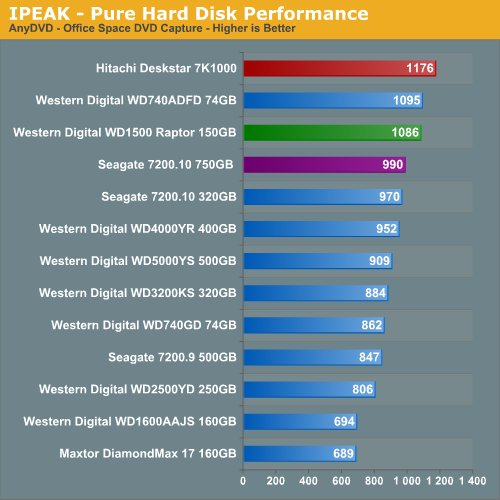
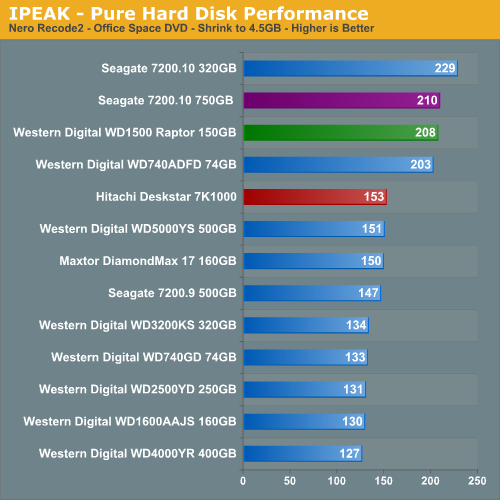
The AnyDVD benchmark is heavily weighted to write requests with the results showing a common pattern with the two 16MB cache Raptors finishing second and third with the 7K1000 once again showing its strength in the write intensive benchmarks due to its areal density and large cache design. We found the Seagate 750GB was pausing during streamed writes due to the smaller cache size after witnessing buffer overruns in the trace file when compared to the Hitachi drive.
The NeroRecode 2 benchmark is weighted to streaming read requests but is balanced by continuous write operations near the end of the test. This benchmark is one of the most demanding ones in our test suite with the disk being active the entire trace file with several 100% utilization peaks. The results surprised us as we expected the Hitachi with its 32 MB cache and high sustained transfer rates to handle this benchmark with aplomb.
However, it turns out after reviewing the trace file results it was obvious that the 7K1000 was hampered by its inability to process large data blocks in sequential order efficiently as it had a number of buffer overruns during the read portion of the tests. This indicates to us the drive firmware is probably tuned more for non-sequential read/writes as the rest of our tests indicate. However, the 32 MB cache should have easily compensated for any potential large block issues in this test and the drive handled previous read heavy request tests with ease. Our initial test results with AAM off only show a two point advantage in this test. We are currently completing tests with AAM/NCQ off and will update the article if there are any noticeable performance differences.
iPeak Game Installation Tests
Our iPeak based Game Installation benchmarks simply show the ability of the hard drive to write data as quickly as possible to the disc based upon the installation software instructions. As detailed in our iPeak setup description we installed the games from our source drive in order to eliminate the optical drive bottleneck. In separate application timing we witnessed basically the same percentage spread when installing the games via our DVD drive so these results are representative of actual installation performance.
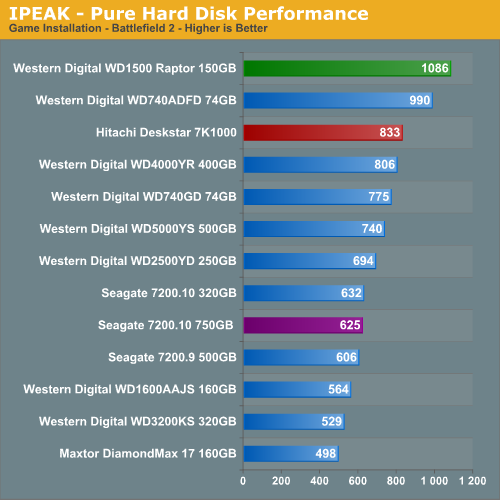
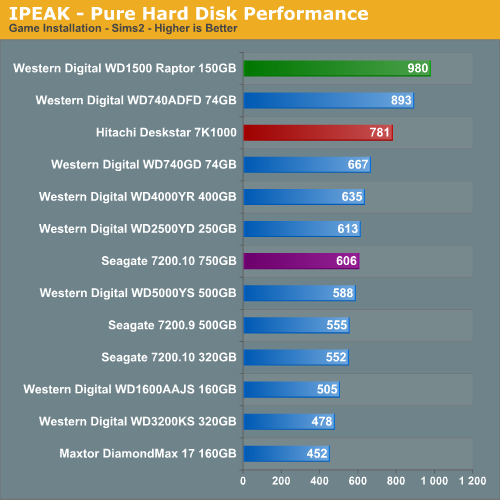
The Raptors once again finish at or near the top in our gaming tests due to their rotational and random access speeds. Our 7K1000 drive finishes ahead of the 7200rpm drives with a great deal of benefit going to the 32 MB cache and high sustained transfer rates. A review of the trace files did not indicate any real standout issues with the Seagate 750GB drive although we noticed several minor dips in performance when the drive was reading information off the source drive. The write performance was generally slower than the 7K1000 in this test and follow previous benchmark results.
We need to remember these tests reflect pure hard drive performance and will be mitigated by the overall system platform as we will see in our application tests. These tests are basically designed around continual read/write requests that favor large cache sizes, properly tuned firmware, and high sustained transfer rates.
iPeak Game Play Tests
The iPeak based Game Play tests are centered on the benefits of having a hard disk that can load non-linear or sequential data files quickly without interrupting the flow of the game.
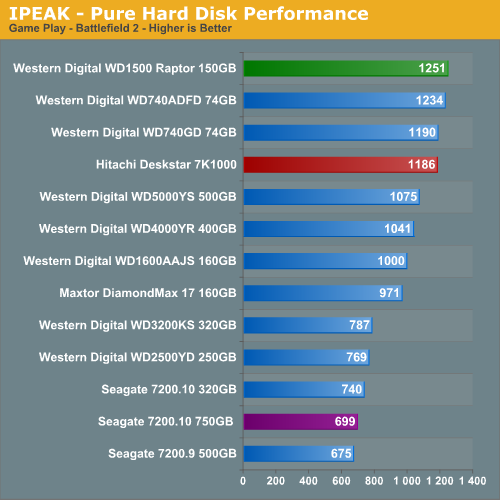
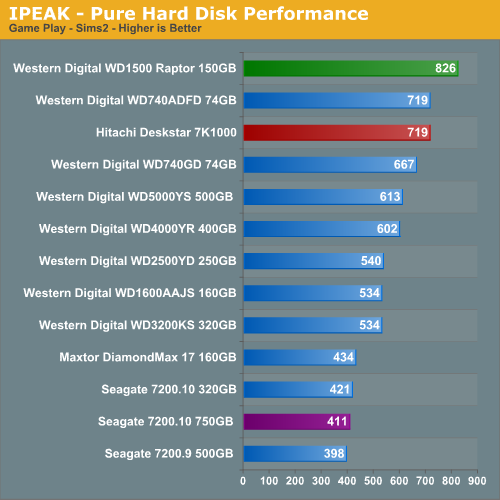
When it comes to gaming the Raptors rule but the 7K1000 is not that far behind with a second place tie in the disk intensive Sims2 and a strong fourth place finish in Battlefield 2. Although we are looking at pure performance results, in subjective testing we finally have a 7200rpm drive that "feels" as fast as the Raptor family of drives when loading or playing a game. The best overall gaming performance in a drive with a SATA interface is still the Raptors but considering the storage size, acoustic, and cost per-Gigabyte advantages of the Hitachi drive we are heavily leaning towards changing our recommendation.
The iPeak based Video/Audio benchmarks are designed around simulating media encoding and HTPC activities. These are basic benchmarks at this time as this section will be expanded once we start testing under Vista. Our change to a dual core processor will assist us in maintaining a balance between the CPU and Storage systems during the trace file creation and benchmarking processes. These benchmarks are CPU intensive in nature but also require a balanced storage system with the ability to handle read and write requests simultaneously in a very efficient manner.


The AnyDVD benchmark is heavily weighted to write requests with the results showing a common pattern with the two 16MB cache Raptors finishing second and third with the 7K1000 once again showing its strength in the write intensive benchmarks due to its areal density and large cache design. We found the Seagate 750GB was pausing during streamed writes due to the smaller cache size after witnessing buffer overruns in the trace file when compared to the Hitachi drive.
The NeroRecode 2 benchmark is weighted to streaming read requests but is balanced by continuous write operations near the end of the test. This benchmark is one of the most demanding ones in our test suite with the disk being active the entire trace file with several 100% utilization peaks. The results surprised us as we expected the Hitachi with its 32 MB cache and high sustained transfer rates to handle this benchmark with aplomb.
However, it turns out after reviewing the trace file results it was obvious that the 7K1000 was hampered by its inability to process large data blocks in sequential order efficiently as it had a number of buffer overruns during the read portion of the tests. This indicates to us the drive firmware is probably tuned more for non-sequential read/writes as the rest of our tests indicate. However, the 32 MB cache should have easily compensated for any potential large block issues in this test and the drive handled previous read heavy request tests with ease. Our initial test results with AAM off only show a two point advantage in this test. We are currently completing tests with AAM/NCQ off and will update the article if there are any noticeable performance differences.
iPeak Game Installation Tests
Our iPeak based Game Installation benchmarks simply show the ability of the hard drive to write data as quickly as possible to the disc based upon the installation software instructions. As detailed in our iPeak setup description we installed the games from our source drive in order to eliminate the optical drive bottleneck. In separate application timing we witnessed basically the same percentage spread when installing the games via our DVD drive so these results are representative of actual installation performance.


The Raptors once again finish at or near the top in our gaming tests due to their rotational and random access speeds. Our 7K1000 drive finishes ahead of the 7200rpm drives with a great deal of benefit going to the 32 MB cache and high sustained transfer rates. A review of the trace files did not indicate any real standout issues with the Seagate 750GB drive although we noticed several minor dips in performance when the drive was reading information off the source drive. The write performance was generally slower than the 7K1000 in this test and follow previous benchmark results.
We need to remember these tests reflect pure hard drive performance and will be mitigated by the overall system platform as we will see in our application tests. These tests are basically designed around continual read/write requests that favor large cache sizes, properly tuned firmware, and high sustained transfer rates.
iPeak Game Play Tests
The iPeak based Game Play tests are centered on the benefits of having a hard disk that can load non-linear or sequential data files quickly without interrupting the flow of the game.


When it comes to gaming the Raptors rule but the 7K1000 is not that far behind with a second place tie in the disk intensive Sims2 and a strong fourth place finish in Battlefield 2. Although we are looking at pure performance results, in subjective testing we finally have a 7200rpm drive that "feels" as fast as the Raptor family of drives when loading or playing a game. The best overall gaming performance in a drive with a SATA interface is still the Raptors but considering the storage size, acoustic, and cost per-Gigabyte advantages of the Hitachi drive we are heavily leaning towards changing our recommendation.










74 Comments
View All Comments
Justin Case - Monday, March 19, 2007 - link
"Considering the importance of data integrity in today's systems"...? You mean like, in yesterday's (or perhaps tomorrow's) systems, data corruption was considered normal or acceptable?Gary Key - Tuesday, March 20, 2007 - link
It was not meant to infer that data integrity was not or will not be important.Spoelie - Tuesday, March 20, 2007 - link
No, but if you lost a hard drive before, the amount of data that would be gone is nothing compared to the amount of data you lose with current hard drives. It's always a BAD thing to lose data, but it's BAD² to lose data². So it's important² to keep data² safe ;pJustin Case - Wednesday, March 21, 2007 - link
"Data integrity" and "drive failure" are two different things. Most data integrity issues are related to bad sectors and corrupted data (and that is why Hitachi chose to go with more platters and lower areal density - less chance of localized data corruption, but actually a slightly higher chance of "catastrophic" drive failure - namely a head crash or a dead motor). The article's author got _that_ part right.The problem was what came after it. It was just as important to "keep data safe" last year (or the year before that, etc.) as it is this year, so qualifying it as "in today's systems" makes no sense.
Gary Key - Wednesday, March 21, 2007 - link
I changed it back to the original text. ;)
Griswold - Monday, March 19, 2007 - link
Looking at the benchmark charts, one thing that pops into the eye is that your world at AT, as far as HDDs are concerned, seems to revolve around Seagate and WD only.But theres quite a few other manufacturers out there that make good drives (that surpass many of the featured drives in one way or another) - this new Hitachi beast proves it.
Go ahead and test more Samsung, Fujitsu, Hitachi and even Excelstor drives.
Gholam - Thursday, March 22, 2007 - link
ExcelStor drives are refurbished IBM/Hitachi.Gary Key - Tuesday, March 20, 2007 - link
We finally have agreements with Samsung and Hitachi to provide review samples so expect to see reviews of their drives ramp up quickly. We are discussing a review format for SCSI based drives at this time and if we can do it right then expect to see this drive category reviewed later this year. We will also be introducing SSD reviews into our storage mix in the coming weeks. While I am at it, our Actual Application Test Suite will under several changes and be introduced in the 500GB roundup. Thanks for the comments. :)
Final Hamlet - Monday, March 19, 2007 - link
Hmm. Only vendor I am interested in seeing him added is Samsung. They have quite a market share here in Germany.JarredWalton - Monday, March 19, 2007 - link
My personal take is that for 99% of users, it doesn't really matter which brand you use. Seagate may win a few benchmarks, WD some others, Samsung, etc. some as well. In reality, I don't notice the difference between any of the HDDs I own and use on a regular basis. I have purchased Samsung, WD, Seagate, Hitachi, and Maxtor. Outside of the Raptors being faster in a few specific instances, without running a low level diagnostic I would never notice a difference between the drives. I suppose I'm just not demanding enough of HDDs?